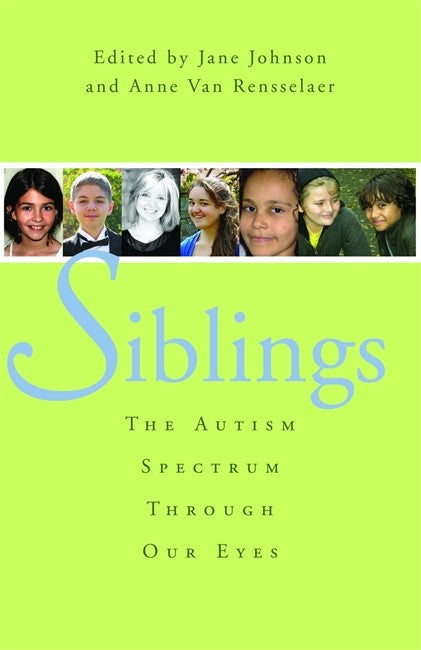Part 1.; 1. Christopher Castaldi-Moller and Joshua Vazquez, Age 10.; 2. Carley Belknap, Age 9.; 3. Cassidy Parker Knight, Age 13.; 4. Maya Cassandra King, Age 10.; 5. Chandra Kelley-Robinson, Age 11.; 6. Alyssa Chmura, Age 19.; 7. Cami Poole, Age 10 11/12.; 8. Ben Jepson, Age 13.; 9. Chelsea Lang, Age 17.; 10. Micah Quindazzi, Age 14.; 11. Anonymous, Age 34.; 12. Adam Barrett, Age 27.; 13. Missy Olive, Age 41.; Part 2.; 14. Susannah Chandler, Age 22.; 15. Rebecca Sicile-Kira, Age 17.; 16. Jenna Cohen, Age 24.; 17. Lisa Cohen, Age 21.; 18. Hannah Burke, Age 15.; 19. Christine Hurd, Age 18.
Description
For the first time, the 'neurotypical' siblings get to have their say...This book is essential reading for children and teenagers with a sibling on the autistic spectrum, and for parents wishing to understand how autism in the family will affect their neurotypical child... 'Sibling - The Autism Spectrum Through Our Eyes' Edited by Jane Johnson and Anne Van Rensselaer is an anthology of what it is really like to be a brother or a sister to someone on the spectrum. The book is divided into 2 sections containing a total of 19 chapters. Each contributor has sufficient space to recall their experiences and to write about what they consider important. Too many books contain just snippets of opinions which the authors use to champion their own voice and because their statements are kept in context there is less likely to be any misrepresentations of their views...Although the book is written principally for siblings, it is actually also very relevant to parents who feel as if they are desperately failing their other children. The book will more than likely to reassure them. The stories in this book very much corroborate the impressions I have formed about the difficulties and benefits of being a sibling to someone on the spectrum... This account is perhaps more honest and realistic in that it acknowledges the frustrations, embarrassment, a sense of being hard done by without having to counter such comments with an immediate positive. The contributor also mentions the times when their sibling was teased or tormented and they failed to act through fear of themselves becoming victims. I felt that these normal human failings were as essential as the positive presentations. Children need to understand that they will sometimes behave in a way that makes them feel guilty or ashamed. However, once again, the most upsetting thing mentioned was when the contributor's brother was teased and misunderstood... I felt emotional through much of this book, in a bitter-sweet way because it exemplifies all that is wonderful about family. It is about the paramount gift we all have when we share our lives with someone of difference and are forced to learn to accept and love each other, just because we are family, and we have no choice and THAT ultimately is a tremendous gift. The message that having autism in the family brings out the best in each of us, permeates all the accounts and one senses it is genuine and not just a platitude. As the mother of someone on the spectrum I'd have to concur with each and every one of them. How proud all the parents must be of these children (including the grown up ones!)

